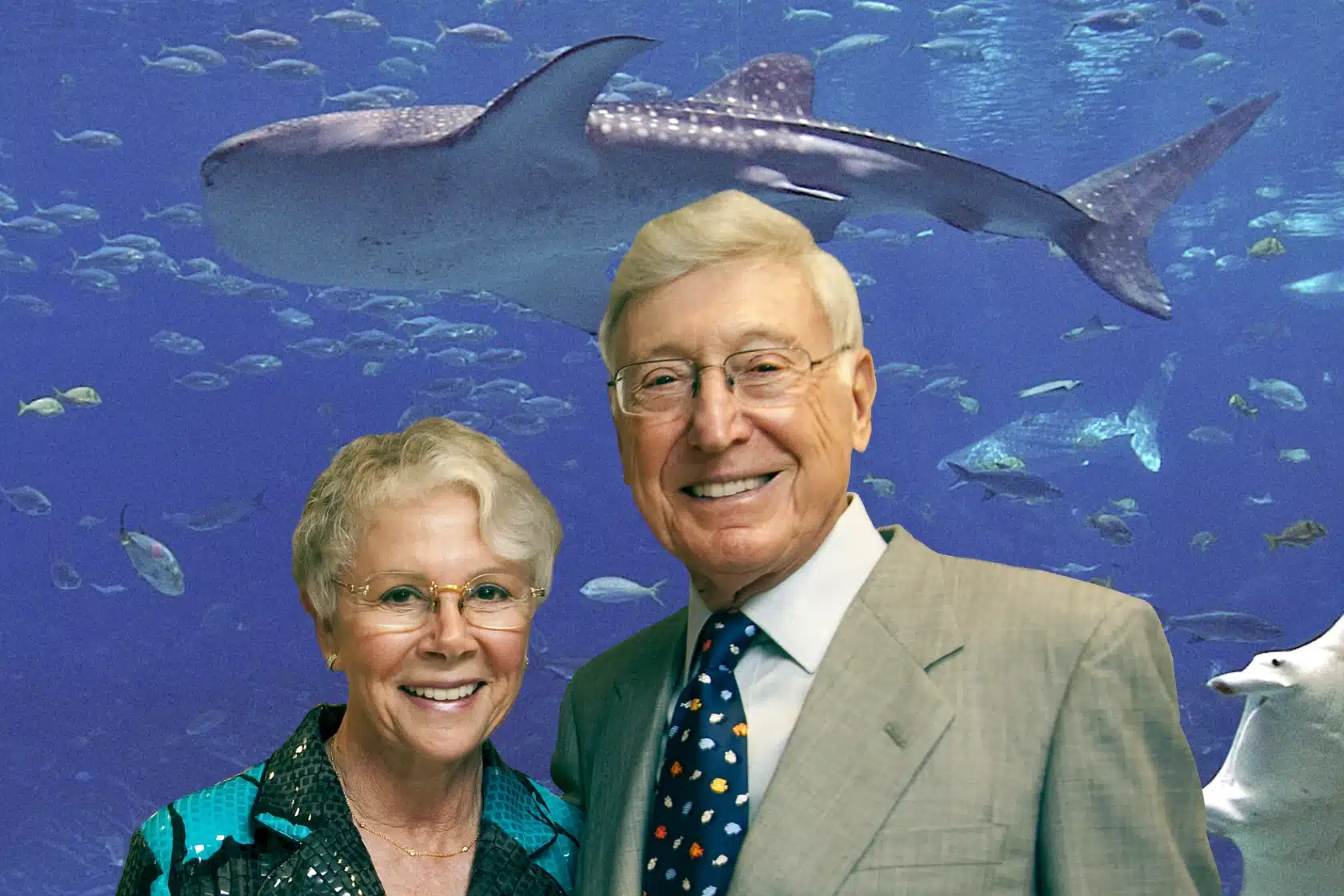- News
- Tue Oct 31
Billionaire Bernie Marcus to Rich People: Get Off Your Rear Ends and Do Something Good
The 94-year-old Home Depot co-founder has donated roughly $2 billion so far, including big bets on the Marcus Autism Center and the Georgia Aquarium.

Bernie Marcus speaks at an event celebrating a major gift to Piedmont Hospital in 2016.
WHY THEY GIVE
Bernie Marcus, the billionaire Home Depot co-founder, wants other rich people to make more of an effort to give big to charity and do more than just write checks. He wants them to get involved with the causes they support, stay involved, and make that involvement meaningful.
“There are lots of very worthy causes out there that are looking for somebody to back them, and there are lots of people with a lot of money that could do it,” Marcus says. “They just need to get off their rear ends and do something good for mankind.”
Marcus, 94, grew up in tenement housing in Newark, N.J. The son of Russian and Ukrainian Jewish immigrant parents, he was the youngest of four children. Marcus’s mother taught him and his siblings the Jewish concept of “tzedakah,” the moral obligation to give back, by putting what coins the family could spare into a small metal box and later giving that money to others in need. The Marcus household was no stranger to financial hardship. Marcus’s father was a cabinet maker who struggled to find enough work to put food on the table.
“If my father didn’t earn money, we didn’t eat, or we had potatoes. That’s what we ate. I remember those days, but it didn’t hold me back,” Marcus says. “I wasn’t jealous of people who had money, but I wanted to know how they made it, because I decided early on in life that I wanted to make a lot of money so that I could do the things I wanted to do and not have to worry about my family. That’s basically what my driving force was.”
Marcus started working odd jobs at 11. He stocked shelves, swept floors and cleaned toilets at a grocery store, churned butter at a local dairy, and set up pins at a bowling alley. In his late teens, he worked summers as a busboy and later a waiter at resorts in the Catskills, even trying his hand at stand-up comedy while there. The money from those resort jobs was good, and eventually Marcus earned enough to attend college.
He graduated from Rutgers pharmacy school in 1954 and started his career as a drugstore pharmacist. He later worked his way up at several retail businesses and made his way to Southern California where in the 1970s he became the CEO of Handy Dan, a chain of hardware stores in Los Angeles. While there, he met Arthur Blank, the company’s vice president, and in 1978, after being fired from their executive jobs, the two men founded Home Depot, taking it public in 1981. Marcus retired from Home Depot in 2002 and since then has focused much of his energy on philanthropy.
Big Bets in Atlanta
The charitable lessons Marcus learned from his mother have had significant consequences. He has been giving big gifts to nonprofits for the last three decades and has given away about $2 billion so far. He plans to leave 90 percent of his fortune — which Forbes estimates at about $9 billion — to his Atlanta-based grant maker, the Marcus Foundation. The foundation gave out nearly $172 million in 2021, the most recent year for which a tax filing is available.
Ever since he started the foundation in 1989, Marcus has given to dozens of different causes and made several significant big bets in Atlanta. Among them was the Marcus Autism Center, a research and treatment center for children on the Autism spectrum. Including the $45 million Marcus gave to create the center in the late 1980s, he has given the organization a total of about $100 million to date. He also pledged up to $200 million twenty years ago to build the Georgia Aquarium — and ended up giving the nonprofit $250 million.
Billie and Bernie Marcus

A few years ago, Marcus decided it was time to rein in his giving focus to five cause areas he cares about the most: children, free enterprise, Jewish groups, medical research, and veterans programs.
Some of his more recent donations to those causes include $80 million to expand the Shepherd Center, an Atlanta specialty rehabilitation hospital that treats patients with spinal cord and brain injuries, stroke, and other neuromuscular conditions; $38 million to Hillel International to recruit and train new leaders of its programs for Jewish students on college campuses; and $20 million to the Gary Sinise Foundation Avalon Network to support cognitive health and mental wellness programs for military veterans, first responders, and their families.
Marcus has also decided to sunset his foundation. Worried that an organization existing in perpetuity would eventually stray from his giving priorities, Marcus has put in place a requirement that the foundation will shut down 20 years after his death. That way, he says, he can rest easy knowing his money will be given away to the causes he supported during his lifetime and by foundation staff and board who have worked with him for years and understand his intentions.
“If you don’t sunset,” Marcus says, “you’re crazy.”
To ensure that staff and board members know what those intentions are, Marcus and his team have created videos of him talking to future trustees about his values and what he wants and does not want to support. The videos are updated regularly so Marcus can be sure his final grant-making intentions are clear.
Eye on Leaders
In the meantime, though, Marcus remains deeply involved in the foundation’s grant-making decisions. He likes to meet with potential grantees and hear in-depth stories about their mission and how their work benefits the people the organization serves. That happens before Marcus, the foundation‘s president Jay Kaiman, and other foundation staff ask any questions about a charity’s budget, finances, and monetary needs.
“The story has to have a powerful message for Bernie to give attention and want to fund something,” Kaiman says. “Then it’s our job to make sure we do the due diligence and can show him what success for that group is going to look like.”
When he is weighing whether to support a nonprofit, Marcus says the story is important, but so is the nonprofit’s leadership team. He learns as much as he can about a nonprofit’s leaders, including the organization’s board and how they set goals and develop plans for the charity’s future.
“If you have a lousy CEO, you have a lousy business, and in charity it’s no different,” Marcus says. “You have to be able to survive on the amount of money you have and be able to produce the kind of results that you want to produce, so if you don’t have a good strategic plan, if you don’t have a good board, how are you going to be successful?”
“The story has to have a powerful message for Bernie to give attention and want to fund something,” Kaiman says. “Then it’s our job to make sure we do the due diligence and can show him what success for that group is going to look like.”
When he is weighing whether to support a nonprofit, Marcus says the story is important, but so is the nonprofit’s leadership team. He learns as much as he can about a nonprofit’s leaders, including the organization’s board and how they set goals and develop plans for the charity’s future.
“If you have a lousy CEO, you have a lousy business, and in charity it’s no different,” Marcus says. “You have to be able to survive on the amount of money you have and be able to produce the kind of results that you want to produce, so if you don’t have a good strategic plan, if you don’t have a good board, how are you going to be successful?”
These days, Marcus spends the bulk of his time on philanthropy. Most of that time is devoted to his own grant making, but he says he also offers advice to wealthy people who want to start giving large sums but are unsure what to support or how to get started. His main advice for wealthy donors? Spend big on causes that are meaningful to them personally, avoid sitting on boards of nonprofits where they won’t have much say, and most importantly: Don’t just write a check and then sit on the sidelines.
“Put your brain to use, and do something meaningful that has an effect on people’s lives,” Marcus says. “The amount of satisfaction you get from it when you help somebody, I can’t explain the feeling. It’s a certain satisfaction you get that you can’t get from a financial statement.”
Ready To Learn More?
An administrator will reach out to you soon!
We respect your privacy and will never spam or sell your information.

